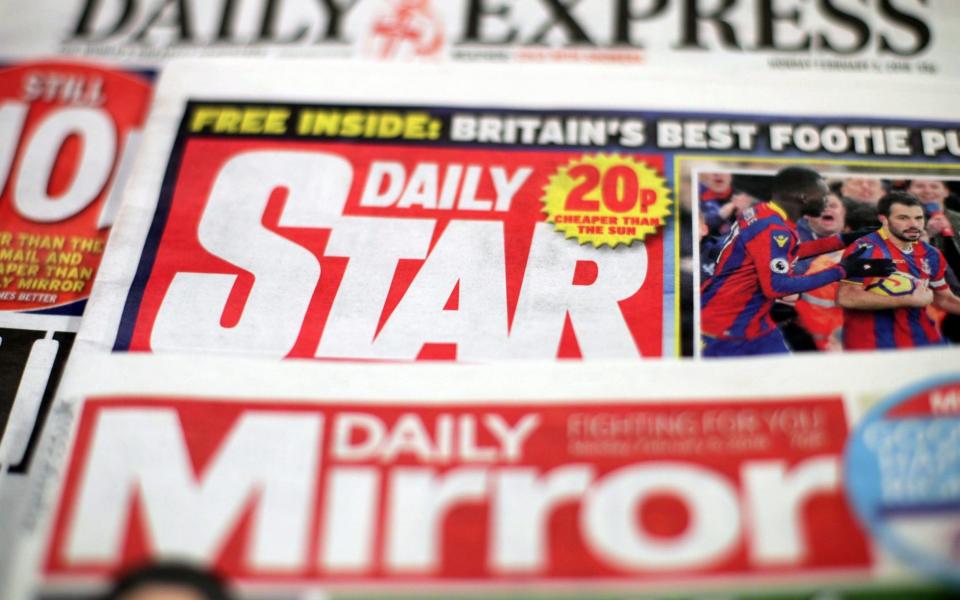Mirror and Express owner to cut hundreds of jobs

Reach, Britain’s biggest newspaper publisher, is making more than one in 10 staff redundant as hundreds of millions of pounds of advertising and circulation income are lost to the pandemic.
The publisher of the Mirror and Express titles, as well as scores of regional newspapers, said it will cut 550 jobs, equivalent to 12pc of its workforce, to save £35m per year.
Jim Mullen, chief executive since last summer, who had been riding a wave of renewed City optimism in Reach’s prospects until Covid-19 struck, said the redundancies were necessary to safeguard its finances through the crisis.
They are likely to raise concern about regional news coverage especially, which is also facing hundreds of job cuts at rival publishers and the BBC.
Among major newspaper publishers Reach is particularly exposed to the slump in advertising, as its focus on tabloid and local newspapers have left it without a digital subscription business able to profit from the massive interest in coronavirus news. Its regional business is also dependent on the small businesses that have been among the hardest hit by the lockdown.
Turnover in the second quarter was down 27.5pc and is expected by analysts to be down by a fifth for the full year, or about £140m, with a lasting impact in subsequent years.
June showed only a small improvement on the peak of the pandemic, with sales down 23.9pc, compared with 30.5pc in April.
Print revenues, which last year accounted for four-fifths of Reach’s business, were already in sharp decline before lockdown. Digital advertising, which had been growing and is at the centre of Mr Mullen’s plans for the future of the publisher and its titles, is now also shrinking.
However, Numis, Reach’s in-house broker, still expected the company to report a pre-tax profit of more than £100m this year and have a cash reserve of more than £20m by its end.
Mr Mullen said: “If you look at SMEs at the height of the pandemic in April, two-thirds of those who advertise with us were simply not picking up the phone.”
He also raised the threat of a second lockdown: "It's not binary and there are a number of scenarios that may occur. These job cuts are a consequence of the impact of the pandemic in the middle of March, to make sure we have the liquidity and the strength to handle a second phase."
He said coronavirus “requires us to accelerate our strategy” and that the restructuring and cost-cutting would help. Reach newsrooms are expected to be centralised, with national and regional teams merged, so that, for instance, coverage of sports teams by local journalists might appear in national titles.
Reach said such changes would “increase efficiency and remove duplication while maintaining the strong editorial identity of our news brands”. It nevertheless drew concern from staff and union representatives over any potential loss of coverage diversity and the uncertainty faced by staff, including over office closures and and expected permanent increase in home working.
According to the National Union of Journalists, more than 2,000 people across Reach will be notified they are at risk of losing their jobs as part of a consultation. An internal company email said 325 jobs are expected to be cut in editorial and circulation departments, with the rest in advertising and back office functions.
As part of the announcement, Reach said it would reverse a controversial pay cut imposed in April, except for Mr Mullen and other members of the board. It will also resume top-up payments to underfunded pension scheme, which at the end of last year reported a deficit of nearly £300m.
Reach said it “recognises the importance of a dividend to our shareholders” but said it will remain suspended, despite liquidity that Mr Mullen said puts the publisher “much better shape than some if not all of our competitors”.
The company’s largest shareholder is Richard Desmond, the former owner of its Express and Star national titles.
Shares closed 14pc lower at 76.2p, valuing the company at about £230m.

